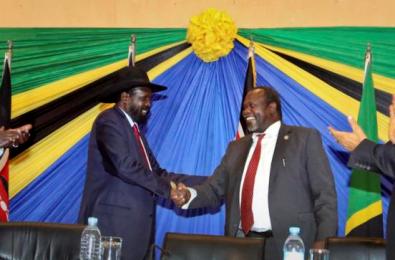JMEC sets timetable towards formation of South Sudan’s transitional cabinet
December 16, 2015 (ADDIS ABABA) – The Joint Monitoring and Evaluation Commission (JMEC), a powerful body set up to oversee the full implementation of the peace agreement signed in August by warring parties in South Sudan, has set a detailed timetable which calls for formation of the transitional government of national unity on 22 January 2016.

The document, a copy of which was seen by Sudan Tribune on Wednesday suggested that the first group of the SPLM-IO’s advance team would have arrived in Juba on Tuesday, 15 December, according to the schedule provided by JMEC, but the date has been changed to 18 December, according to officials of the opposition group.
A first group of the advance team of over 150 people may travel to Juba on Friday, 18 December, followed by two more groups few days later, to bring the total number to 609 which may all arrive in the South Sudanese capital before Christmas day or end of the year.
Upon arrival of the advance team to Juba, a number of meetings will have taken place for a number of days or weeks with participation of all members to the bodies established under the peace agreement as the mechanisms for implementing the agreement.
The meetings will be chaired by the head of JMEC, former president of Botswana, Festus Mogae, who will be reporting to the East African regional bloc, IGAD, the African Union (AU) and the United Nations (UN) on progress made and obstacles faced in the peace implementation.
On 23 December 2015, according to the timetable, the parties to the agreement, namely president Salva Kiir’s government, opposition faction of SPLM-IO, former detainees and other political parties will select their respective ministerial portfolios which will constitute the future council of ministers in the would-be transitional government of national unity.
On 5 January 2016, the parties will submit names of their selected additional members to the transitional national legislative assembly in accordance with the power sharing provided for in the peace deal.
The parliament, the document indicates, will be expanded or reconstituted on 7 January 2016 with membership from all the parties to the agreement, while on 14 January, a week later, the parties will submit names of their designated ministers to the council of ministers, corresponding to the ministerial positions they will have selected on 23 December, a week from now.
On 19 January the new transitional parliament will pass the amended transitional constitution and on 20 January, president Kiir will assent to the amended constitution, paving the way for formation of the transitional government of national unity on 22 January 2016.
(ST)
